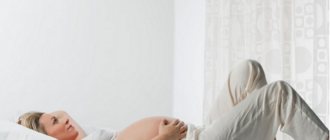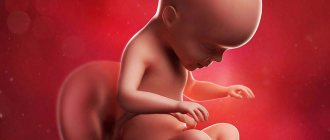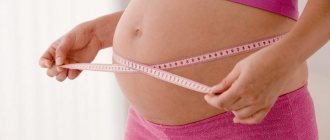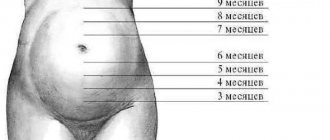7th month of pregnancy
Congratulations! You have entered the third trimester of pregnancy. From the 4th to the 6th month you may have felt relief and a surge of energy, but now the situation is changing.
During this period, the expectant mother may feel large, slow, and her ability to concentrate decreases. Nature does everything possible to ensure that nothing distracts it from the main task of these months - maintaining the life of a new creature, ensuring its safety and full development.
Now it is important to accept the changes taking place in the body; they have a strong justification, so you need to be patient and calm.
What's happening
Your condition at this stage will not change dramatically.
- Increased sweating, feeling hot and cold are familiar feelings. They are associated with accelerated metabolism and increased fluid volume in the body.
- During this period, swelling will be most pronounced. In the evenings, your legs may feel tingling and heaviness. There are traces of familiar jewelry on his hands. Do not try to drink a lot after 18-19 hours and eat salty, spicy foods, which will aggravate the situation.
- You may feel like your discharge has increased. This is the norm. It is worth paying attention if they suddenly become of a different consistency, a strong odor or itching appears. And if the discharge is voluminous, colorless and noticeably liquid, consult a doctor immediately. This may result in amniotic fluid leakage, which at this stage threatens premature birth.
- In the seventh month, the uterus grew so large that it began to displace the upper internal organs, squeezing the diaphragm. Therefore, there is shortness of breath, pain in the hypochondrium and a frequent feeling that there is not enough air.
- A large load at this time falls on the spine. Also, due to the growing uterus, pain occurs in the lower back and abdomen. Muscles and ligaments are stretched. Pinkish stripes called stretch marks (stretch marks) may appear on the skin.
- The first milk, colostrum, may form in the breast. You will notice it in the form of droplets released throughout the day. To avoid discomfort, use special bra pads.
We recommend 3 months of pregnancy
How does the expectant mother feel at 7 months
As in previous months, a pregnant woman may experience the following symptoms:
- fatigue and forgetfulness;
- frequent urination;
- tender and swollen mammary glands, secretion of colostrum;
- stretch marks on the chest, abdomen and thighs;
- bleeding gums;
- increased salivation;
- nasal congestion;
- vaginal discharge;
- heartburn and constipation;
- flatulence, hemorrhoids;
- varicose veins, leg cramps, mild swelling of the limbs;
- certain breathing difficulties;
- Braxton Hicks training contractions;
- back discomfort.
All of the above phenomena are generally characteristic of pregnancy; every (or almost every) expectant mother experiences this. The easiest way to survive them is to trust the situation and realize that all these problems are normal and temporary.
What does the doctor check in the 7th month of pregnancy?
In the 7th month of pregnancy, you may see a mark on the scale with 7 – 9 additional kilograms. The total increase from the moment of conception to the end of the third trimester is normally 9 - 12 kg. Remember that everything is individual, and your weight gain during pregnancy depends on how much weight you had before. However, discuss your rate of weight gain with your doctor if it is significantly out of the average range and, most importantly, gives you questions and concern.
- You will see your doctor once every 2 weeks this month. This regimen will continue until 36 weeks, when the doctor will be waiting for you in his office every 7 days.
- As always, the doctor will measure your weight, abdominal circumference, uterine size, pulse, blood pressure, listen to the fetal heart rate with a stethoscope, and check your legs and arms for swelling and varicose veins. The height of the fundus of the uterus at 30 weeks is 28 - 30 cm - the point in the middle between your navel and ribs.
- This month or early next month, you may be scheduled for a third scheduled ultrasound (usually performed at 30–34 weeks), fetal CTG (cardiotocography), and tests for infections (the same ones you took in the first trimester).
The results of all examinations will be entered into the exchange card - a medical document that began to be filled out when you registered with the antenatal clinic and reflects the entire course of pregnancy. It is issued no later than the 30th week, and you must always have it with you at every doctor's appointment.
What changes occur in the female body in the 7th month?
1. Chest. The mammary glands have significantly increased in size, become heavier, and milk ducts continue to form in them so that the baby receives its first “food” after birth. Sometimes you may leak colostrum, a yellowish liquid that precedes milk and carries an invaluable supply of immunoglobulins.
2. Blood circulation. The volume of blood circulating in your body has increased by 30–50%. Nature intended this to ensure blood supply for you and your baby and compensate for natural blood loss during childbirth.
3. Pressure. Starting from the 30th week, blood pressure, after it dropped slightly in the first trimester, gradually returns to the physiological norm.
4. Movements and other signals from within. Many women are interested in how often they should feel fetal movements. Your doctor may ask you to count them. The overall level of activity is individual, as is the amount of movement that each baby demonstrates to its mother. There is no point in comparing your pregnancy to the pregnancies of other mothers - compare your baby's activity level day by day.
Most likely, you have already noticed that the baby in your belly has its own internal clock. Notice how many movements he makes during periods of wakefulness. The movements can be any: kicks, elbow pushes, somersaults or smooth swinging of the arms. If you notice significant differences in your baby's activity level, discuss this with your doctor.
5. Breathing. The uterus is growing and putting pressure on the liver, stomach, intestines and diaphragm, which is why you have started to notice that it is becoming a little more difficult for you to breathe. Throughout the current and next month, this feeling will only intensify, but in the 9th month there will be relief: the baby will sink a little lower into the pelvis, this will allow your lungs to “open up” a little, and you will breathe “fully.”
6. Braxton Hicks contractions (training cramps in the lower abdomen) become more intense. Now they last from 30 – 60 seconds to 2 minutes and can occur from once every few days to several times a day.
7. Mood. Since the external signs of your pregnancy are obvious to others, you become the object of attention: people on the street and in public places try to help you, give way to you, relatives and friends touch your tummy. But at work they may stop taking you seriously. Don't give up your positions, but don't get overtired either.
Increased attention leaves an imprint on the psychological state. You may feel irritated, have mood swings, and want everything to be resolved quickly. This is absolutely normal. Find a positive outlet for your negative feelings and thoughts. For example, if you are worried about whether you will have time to buy everything you need for childbirth and baby care, start looking for the necessary items now.
8. Fatigue. You may feel more tired than before. This occurs due to increasing weight and changes in the position of organs in the abdomen. You want to start slowing down your pace of life, but even this requires strength.
Here's what might help:
- Do short sets of exercises that can invigorate you. At work, you can do a few circles around a building or block, if you are at home, go to the pool or yoga for pregnant women;
- take short breaks while working. Raise your feet and place them on a stable surface, close your eyes and rest if you spend your working day walking or standing. If you have a sedentary job, you need 5-minute walks around the office every hour to restore normal blood circulation;
- eat often and in small portions. You need complex carbohydrates (grains) and good proteins (lean meats, sea fish, eggs). Fruits, nuts and dried fruits are suitable for snacking.
Baby development
A child at 7 months of pregnancy has fully formed internal organs. If for some reason labor begins earlier, he has a chance to survive and grow up completely healthy (applies to babies born at the end of the month). If the baby appears at the beginning of the 7th month, then it is much more difficult to get out. This requires a lot of effort and the chances of a positive outcome are much less.
We recommend: 8th month of pregnancy: how many weeks is it, what week does it start from?
In the mother's tummy it occupies a comfortable position, in which it remains until birth. Most often it is curled up into a ball, because it is already quite large and does not fit in the uterus. His movements become more rare, but intense.
If the birth of a boy is expected, then it is at seven months of pregnancy that the testicles descend into the scrotum. There is no need to worry if this does not happen, the permissible norms are up to 14 days after birth.
The baby's face takes on the familiar childish outlines, the folds of his skin are smoothed out and the baby's appearance becomes more attractive. Children begin to have “cheeks”, which indicates the accumulation of a subcutaneous fat layer. It performs a protective function and its presence is simply necessary. It is the layer of fat that will provide protection from hypothermia if the baby is born prematurely.
The pupils of a small person take on the color and shape of a newborn. The baby already knows how to open his eyelids. The seventh month of a baby’s development in the womb is associated with the ability to distinguish between light and dark and to squint its eyes.
The ears of a small person are fully formed and the auditory system allows one to distinguish various kinds of sounds from the outside world. The child reacts to them differently and may experience dissatisfaction or peace.
The circulatory system works smoothly and fully supplies the fetal organs with oxygen.
The digestive system is gradually preparing to accept food in a different form.
The total weight of the little happiness in the womb in the seventh month is approximately 1200 grams, and the height is about 33–35 centimeters.
How to reduce back discomfort
A growing belly during pregnancy changes a lot not only in your appearance. You feel large, your movements gradually slow down, and your gait becomes swaying from foot to foot. In addition, you begin to feel discomfort in your back - tension and pain, especially in the lower back. What can be done?
- Watch your posture.
- Find comfortable positions.
- Alternate standing and sitting body positions.
- Choose comfortable shoes with low heels or platforms.
- Place a hard (orthopedic) mattress in the bed.
- Wear a bandage belt or special supportive panties and a bra for pregnant and nursing mothers (it secures heavy breasts well, which relieves excess pressure on the back). Don't forget to consult your pediatrician first.
- Find a comfortable sleeping position: take several pillows and place one between your knees, under your stomach and behind your back, or use a special pillow for pregnant women.
- Do exercises for pregnant women (for example, this: with a straight and motionless back, move your pelvis forward and backward), do yoga, go to the pool for classes for expectant mothers.
- Do the knee-elbow pose. To do this, you need to kneel down, spread your legs shoulder-width apart, tilt your head and upper body to your elbows on the floor, and relax. You can use a pillow or small exercise ball to support your upper body. Doctors recommend performing the knee-elbow pose 2 - 3 times a day, especially before bed, for 5 - 20 minutes. The pose is useful not only for back pain, but also for relieving tension from the internal organs, on which the uterus presses in the vertical position of the body, and also for ensuring that the baby is positioned correctly in it.
What is important to know about nutrition in the 7th month
We talk about proper nutrition during pregnancy in separate materials. Now it is important to know that the need for calcium is increasing.
- The baby’s bones become stronger, and the fetus takes the calcium necessary for their construction from your body. At this time, 250 mg of calcium should be supplied to him daily. Make sure you have enough of it in your diet.
- If milk and dairy products (cheese, cottage cheese, yogurt and kefir) are not the best solution for you, there are other sources of this element (listed in descending order of quantity): eggshells, leafy green vegetables (all types of cabbage), legumes and nuts .
Possible risks
If a woman experienced any unfavorable factors during pregnancy, then there is a high risk of premature birth at twenty-eight weeks, that is, by the end of the seventh month. Of course, with proper medical care, in many cases the child’s life can be saved, since his body can already exist independently. However, it is better to follow all doctor's instructions. A woman needs to be examined by her gynecologist a couple of times a month. For example, continuity of obstetric care in settings with effective obstetric services can reduce preterm birth rates by approximately 24%**.
Frequent trips to the toilet
Your growing uterus puts pressure on your bladder, so you may need to go to the toilet more often than before. Sometimes a mother-to-be experiences a sudden urge to urinate, called “urge incontinence.” About half of women preparing to become mothers for the first time experience this condition. How to help yourself?
- Set a routine for going to the toilet, for example every half hour to an hour, and stick to it. This way you will avoid a sudden attack when the bladder is full, when it will be difficult to control urination.
- Train the pelvic muscles (those involved in excretory functions and those responsible for childbirth). Kegel exercises can help you.
- Drink 1.5 - 2 liters of fluid (8 - 10 glasses) per day to avoid dehydration.
- Reduce the amount of caffeine as much as possible (keep only one cup of coffee or 2 - 3 cups of tea per day) - it is a strong diuretic.
- To avoid urinary incontinence when you sneeze, blow your nose or cough, use this trick: open your mouth at this moment. This will relieve pressure on the diaphragm and help avoid trouble.
- If you are going on a trip or other event during which it is difficult to go to the toilet, buy and put on adult diapers on time, you can feel confident with them. This measure will make you feel calm, and women all over the world do this, there is nothing unusual here. Many adults wear diapers if necessary, for example, surgeons during complex, multi-hour operations.
Changes in a woman's body
In the seventh month of pregnancy, the following changes occur in the body of the expectant mother:
- The abdomen quickly increases in size. A woman’s weekly weight gain during the current month can be 300-550 g. By the end of the 7th month, a woman weighs 8-13 kg more than before conception.
- Heartburn may get worse. This is due to the relaxation of the esophageal sphincter under the influence of progesterone and the pressure of the uterus on the digestive organs. You should not get rid of the symptoms of heartburn with the help of soda, because when taking a soda solution orally, swelling may increase in pregnant women.
- The volume of vaginal discharge at this time increases slightly. White or light yellow discharge is normal. The appearance of itching and burning, as well as the detection of curdled lumps of mucus in them may indicate the development of thrush. Brown or bloody discharge is a dangerous symptom, because it occurs when placental abruption or the onset of premature labor.
- If the expectant mother is malnourished, her hair may suffer, which may begin to fall out more or become dull and brittle. For prevention purposes, it is recommended to take multivitamin preparations recommended by your doctor, and also remember to eat enough fresh fruits, vegetables and protein foods. It is highly undesirable to dye your hair to prevent the chemical components of the dye from entering the pregnant woman’s body.
How to deal with heartburn
Thanks to hormones, even in the first trimester, the valve that separates the stomach from the esophagus begins to weaken in pregnant women. It is responsible for preventing stomach acid from being thrown out from one part of the gastrointestinal tract to another, but during pregnancy it can sometimes begin to fail you, and then you feel a characteristic burning sensation in the esophagus and an unpleasant taste in the mouth. This is heartburn.
The belly continues to grow, the uterus displaces organs from their places, the stomach rises higher and closer to the throat, and the attacks of heartburn are felt more and more intensely.
To deal with it, you can try something from this list:
- exclude spicy, fried and fatty foods, high-acid foods, carbonated drinks;
- go from 3 meals a day to 5 – 6 meals a day;
- eat small portions;
- Make sure that when eating, the upper body is in a strictly vertical position;
- Do not eat before you are going to lie down (for example, before going to bed).
We talk about this in more detail here
Child activity
The seventh month of pregnancy is characterized by a particularly energetic baby. His movements become constant and organized. Even though he has grown, there is still enough space in the uterus for entertainment. The expectant mother can feel not only the baby's playtime, which usually happens when you are in a calm, static position or sleeping. The woman also feels the child's emotions. For example, when he gets scared, doesn’t like something, or, on the contrary, likes it, the baby lets him know about it with a push.
We recommend 4 months of pregnancy
It is worth paying attention to frequent and sharp kicks or changes in activity. Of course, they can talk about the baby's temperament. But it is better not to ignore them, because this often indicates hypoxia (lack of oxygen) of the fetus. See your doctor.
How to relieve swelling and varicose veins
This month your belly is already big enough that you can no longer see your own legs when standing. Still, you couldn't help but notice that your ankles were swollen and some of the veins in your legs were starting to bulge.
Mild swelling during pregnancy is natural if it is localized in the ankles, feet and fingers. This is due to fluid stagnation in the lower part of the body.
The expansion of veins is also natural. The valves that push blood through the vessels weaken during pregnancy, the blood begins to flow in the opposite direction and stagnates in certain areas. Under the influence of hormones, the walls of blood vessels become more elastic, they are bursting with the pressure of increased blood flow, and the result is obvious: 40% of pregnant women experience varicose veins.
You can alleviate your condition by taking the following measures:
- keep your legs horizontal more often, or better yet, raise them above your head, switch between standing and sitting positions, do not sit cross-legged;
- wear compression underwear (stockings, tights), but at this stage it is better to put the knee socks away in the closet (they prevent free blood circulation in the limbs);
- for swelling, you can do a light massage and self-massage of the legs, especially the feet and ankles (not for varicose veins);
- The “bicycle” exercise in a lying position or simply bending and straightening the legs is good at dispersing stagnant blood in the limbs. Consult your doctor as lying on your back may be contraindicated for you;
- It is better to postpone squats in the last trimester for a while.
Do not reduce the amount of fluid you drink per day to avoid swelling. The daily norm is at least 1.5 liters (8 glasses). If the body experiences a lack of fluid, swelling will only intensify, as the body will accumulate water to avoid dehydration.
How to reduce the appearance of hemorrhoids
Hemorrhoids are a condition associated with the same varicose veins, but located in the rectum. It appears most often in the third trimester, but can be earlier. Hemorrhoids are directly related to constipation, which, coupled with increased pressure on the rectum, are its causes. Staying on your feet for a long time and the age of the mother also affect the development of hemorrhoids.
This condition, which causes discomfort to pregnant women, goes away after childbirth. What can you do now?
- Eat a lot of fiber (vegetables, fruits, dried fruits, especially prunes).
- Drink 1.5 - 2 liters of liquid per day (8 - 10 glasses).
- Alternate sitting and standing positions.
- Stay physically active.
- If you experience pain, wipe the anus with a cotton swab dipped in soda solution or with an ice cube.
- Consult your doctor for additional measures.
We've talked about mom - now let's look at the baby.
Child development in the seventh month
During this period, the brain enlarges and nerve cells become sensitive to various stimuli. For example, a baby may jump from a sudden noise, or, conversely, calm down. Watch him and you will see this. The final stage in the formation of the brain occurs, the sulci and gyri acquire clarity.
The baby turns his head towards the continuous bright light outside photo: babycenter.com
Over the course of 7 months, the child gained subcutaneous fat, and his skin acquired a pink tint (instead of the previous red). He opens and closes his eyes, framed by eyelashes and eyebrows, in an absolutely meaningful way. Can distinguish tastes thanks to receptors on the tongue. The hair on the head continues to grow.
The fetus continues to train its respiratory system, trying to inhale and exhale voluntarily. Sometimes he swallows amniotic fluid, which causes hiccups. But the lungs are not formed enough for independent life. Therefore, if the baby appears at this time, he will need medical attention.
The body continues to develop. A small heart beats clearly. The immune system has matured and thermoregulation has improved. The baby's kidneys produce up to half a liter of urine per day. The intestines function well. The formation of the hearing aid is completed. Perinatal specialists advise talking to your child more, because he can already distinguish between voices and intonations.
This is a period of intensive exploration of your capabilities. The baby actively plays with the umbilical cord, pushes away from the walls of the uterus and continues to grow.









